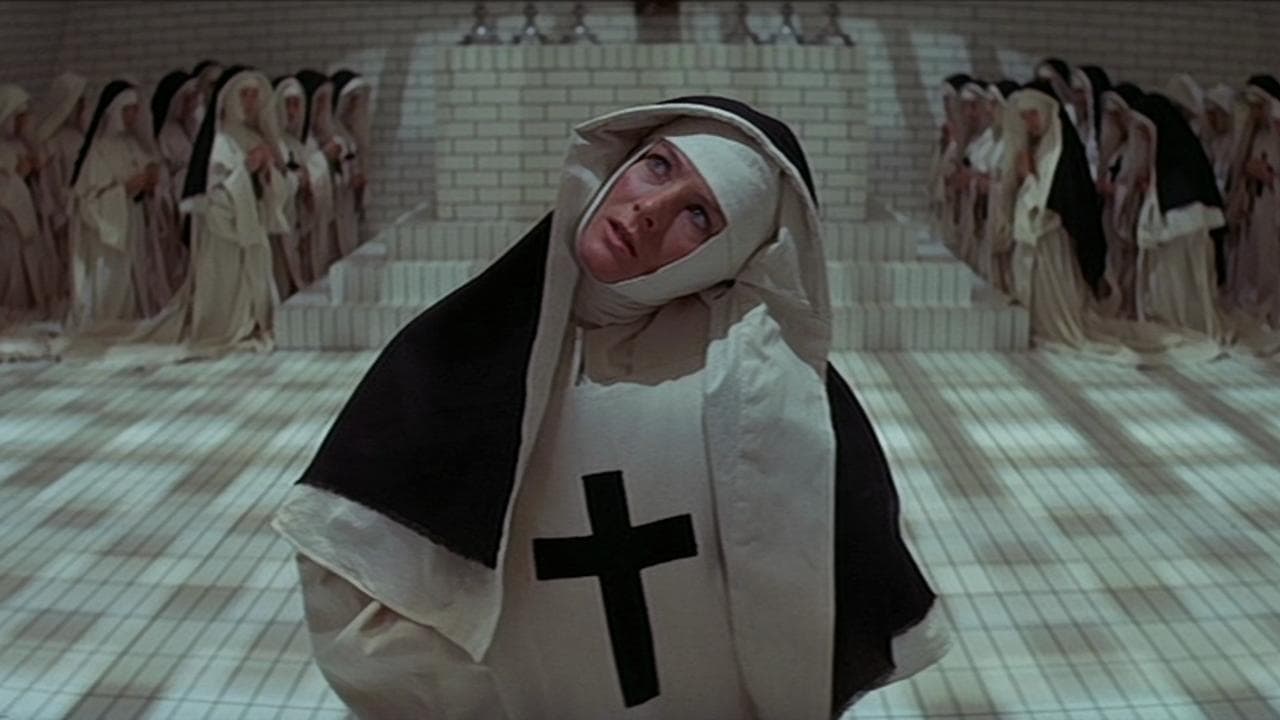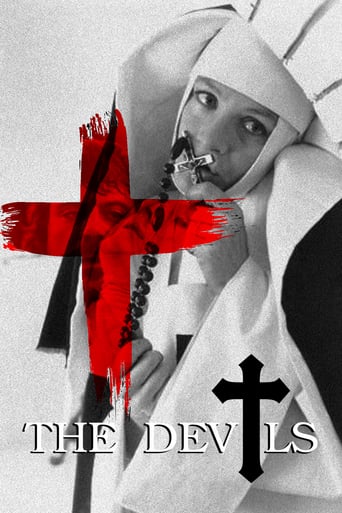UnowPriceless
hyped garbage
Bea Swanson
This film is so real. It treats its characters with so much care and sensitivity.
Janae Milner
Easily the biggest piece of Right wing non sense propaganda I ever saw.
Tayyab Torres
Strong acting helps the film overcome an uncertain premise and create characters that hold our attention absolutely.
UnsleepingHorror
"If God wants you to suffer, then you should want to suffer. And accept that suffering gladly." – Urbain GrandierLike Braveheart, before Braveheart, Ken Russell's The Devils is a depiction of a historical struggle for liberty against oppression. Except, in this case, beneath the drama is a scathing satire. Highly controversial for its time, and banned in several countries, the film was given the "X" rating in both the United Kingdom and the United States upon its original release. That's even after trimming down some of its most "offensive" content. Nonetheless, the wealth of sexuality, sadism, and heresy present in the theatrical edit is unprecedented for its era.The film is unconcerned with disputing theology, but conveys a harsh reality about the machinations of power hungry officials; bending laws and the word of their creator to benefit their corrupt interests. Subjugating the masses, indebting them to the church through guilt of their own sins. It is based, in part, on the play The Devils by John Whiting, as well as its source material The Devils of Loudon, a novel by Aldous Huxley. Furthermore, each of these are accounts of the 17th Century Roman-Catholic priest Urbain Grandier. who inherits leadership of the town Loudon after the death of its Governor.Grandier is a debaucherous man who seems determined to tear himself apart on his way to meet his God. The kind of man who would yell at a defenseless baby simply for crying. And he does. Yet he is softened upon meeting Madeleine de Brou, whom he marries in secret. This act becomes a rumor spread by two spies under employ of men who seek to destroy their only obstacle in taking over Loudon: the priest himself.Thus, word of this communion reaches Sister Jeanne, a nun obsessed with Grandier, whose fantasies of the man are reprehensible (for a nun). Overcome with jealousy, her reaction is to fabricate a hideous lie. Grandier has snuck into her chamber at night, she claims, then proceeded to ravage her. To attain their goals, the web of antagonists use Sister Jeanne's lie to instigate mass hysteria. An event known in history as the "Loudon Possessions," where an increasing number of nuns made similar claims of night visitations from devils. I'll be honest, I debriefed about the history via the internet. I'm no historian. Shocking, I'm sure.At this time a witch-hunter is brought in to perform an exorcism. A sinister attempt to prove Jeanne possessed, or bewitched by Grandier, in order to indict the man. Through torture they squeeze out the confession they seek. So their mock trial begins.Oliver Reed as the priest in question gives a thoroughly compelling performance. Stoic, genuine, and perhaps the film's most invaluable asset. Don't consider this to be dismissive of the rest of cast, however. Vanessa Redgrave (Jeanne) is pitiable and spiteful, Dudley Sutton is heartless and manipulative, and Michael Gothard as the witch-hunter is maniacal and entirely despicable. With all of these great performances coalescing, the drama is Shakespearean. Or reminiscent of Alexandre Dumas. No coincidence since Dumas wrote a play entitled Urbain Grandier.The scale of the film is immense, often exhibiting huge crowds in a given scene. Including a massive orgy, er... mass exorcism. Know that for the audience it's a farce, and is in fact quite humorous. Alright, not all of us find humor in heresy. But like I said before, The Devils isn't a critique on belief, but on those who manipulate the beliefs of others. A story about repression on a grand, as well as personal, level.You could pinpoint some blemishes (for example: the hump of Sister Jeanne's deformed back isn't quite the same tone as her skin, and despite taking place in France there are no French actors to speak of), but nothing detrimental to the experience. It's rare that a movie is so successfully impactful. Depressing, comedic, and horrific in a way that's real. Had The Devils not been reappraised in recent years I might not have come across it, which would have been a considerable loss.Verdict: High Recommendation
Irishchatter
I honestly thought this was too fake to be an original horror movies in the 70's. The scene were Vannessa Redgrave's character as the nun, has an episode when she thought of the cardinal(Reed's character) while praying to get rid of the "demon" inside her. It was just poorly done like you would think they made the scene more powerful and a lot traumatising. However with me, it was just disgust and a messed up way to watch something like this while you were trying to enjoy the movie, but you just couldn't. Seriously I just thought everything was too fake in the movie, the blood, sex scenes, costumes, etc. In my personal opinion, this is one of worst movies that Vanessa Redgrave and Oliver Reed were involved in!
Mr_Ectoplasma
And I'm serious. Ken Russell's infamous masterpiece, "The Devils," focuses on a seventeenth century French village where a group of Ursuline nuns incite chaos, sacrilege, and full-blown Catholic hysteria after they accuse a local priest of witchcraft.If anyone has read Aldous Huxley's brilliant historical novel on which the film is based, then they are well familiar with the story, which is actually based on historical fact. Was it possession, or merely good old-fashioned religious mania? Ken Russell would contest the latter, and he's probably right.In any case, this oft-discussed, little-seen film is Russell's magnum opus, and it's disgusting that he never lived to see the film receive proper treatment from the Warner Bros. cronies who have vainly kept the film under wraps for decades. "The Devils," in all of its controversial imagery, histrionics, and shocking thematics, is truly a work of high art, and deserves to be treated as such. In a perfect world, this film would be regarded with the same level of praise we give "The Exorcist." The problem is that, in spite of all its vulgarities, a film like "The Exorcist" reifies the religious establishment, while "The Devils, at the very least, challenges it; at the most, it seeks to dismantle it; and that is the reason it's had so much opposition from its corporate containers.As far as the film itself is concerned, the cinematography here is surreal and at times hallucinogenic, with bizarre frames of desert landscapes, and the stone, white-walled dwellings of the nuns which evoke the sanitized environs of a psych ward. The narrative unspools at an even pace, and the audience sees a car crash coming from a mile away, yet the entire ride there is engrossing, both visually and thematically. Oliver Reed turns in a fantastic performance as Father Grandier, though I feel that Vanessa Redgrave is the real star here; her performance is terrifying and electric. She is perhaps the most vulnerable character in the film, and yet the most dangerous; the worlds she inhabits are projected by Redgrave with unbelievable dynamism. Counter to her is Gemma Jones as Grandier's naive "bride." Michael Gothard is even more over-the-top than Reed, playing a mad witch hunter, and Georgina Hale is fantastic and sinister as Grandier's sidelined sexual exploitee.As far as my claim that "The Devils" may be the most religious film ever made, by that I mean that it is profoundly critical of institutionalized religion and its turning in on itself. The film is admittedly vulgar, over-the-top, and profane—but it plays out the extreme, unchecked hysteria that threatens the integrity of a religious populace. The film is not so much "anti-religion" or "anti-Christian" as it is anti-institution (and anti-nationalist, while we're at it). The film is highly critical of not just the church, but is also laden with various themes of nationalism, church and state relations, governance and secession, and various other political topics. The film is rife with these various commentaries, and this is likely one of several reasons aside from its more blasphemous elements that Warner Bros. have padlocked it."The Devils" is one of the most spiritually politically significant films I've ever seen, yet, as of 2016, your only odds of watching it in North America are via a widely-circulated bootleg, or a scant VHS put out by Warner in the eighties (which features a heavily edited version of the film, no less). I pray the film will someday be given the credit and treatment it deserves (pun intended). Russell didn't live to see it happen. 10/10.
danthedanimal
I saw this movie when it was first released with all the hoopla and X rating and I wanted to like it. I saw it six more times hoping that all the hype about Ken Russell's photographic genius would sweep me up and make me think this was an iconic piece of cinema. God knows we heard a lot of people say he was brilliant after Women In Love. But time does something to us with perspective and vision. And as beautiful as I think this film was shot... I just couldn't get past how indulgent and obtrusive Ken Russell's camera was to the story. He was so obsessed with creating a visual that story is lost.. emotion is lost.. we are completely extracted from anything that would make us feel "involved." I love Vanessa Redgrave and I think the role she had in this was brilliant if it had been in the hands of someone who made you care rather than someone more concerned about cinematic trickery. I hope at some point in time another director attempts to tell this story in a way that pulls us into it rather than pushes us out of it.

